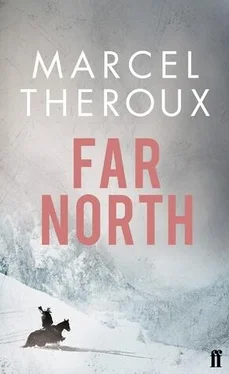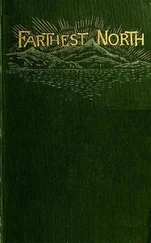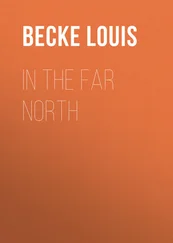*
Then, one day in early November, in the gloom of mid-morning, I came upon a felled tree by the roadside. When I saw it at a distance, I thought it had toppled of its own accord, but up close there was no mistaking the axe marks in the trunk, or the freshness of the cuts. It had been taken down recently. And further along, another. And another.
Still, just because someone’s smart enough for axe-work, doesn’t make them a friend. So I swung myself down off my horse, and I led them on foot through the thicker trees. I stumbled in the fresh drifts and sweated into my furs. It was slower going, but there was less chance of being surprised. And bit by bit I home in on an unmistakable sound: the zip of a woodsaw, working back and forth through timber.
I tied up the horses and went on alone, crawling on my belly under the branches, until I could just make out the feet of the two men working. They were wearing felt boots, which meant they weren’t Tungus.
Laying there, with a pile of snow in my face, gazing at their feet, I thought, This is what we’ve got to. In the Far North, walking up on a man is fraught with peril. The constant fear between people is like a fog that makes them seem larger than they are and all their gestures threatening.
*
My intention was to stand up and approach them as slow and friendly as possible, but with one hand on my gun nonetheless.
The trouble was I got caught up in the thick brush at the edge of the roadside on my way out of the wood. My boot was trapped in the fork of a branch. They heard me struggling in it and stopped sawing.
When I tried to untangle myself, I ended up crashing out of the brush onto the highway, waving my gun in the air because I had lost my balance. The two men panicked and dropped their saw on the log with a clang. And then I noticed a third with a rifle who had been standing too far off for me to see. He turned and lifted his gun to squeeze off a shot.
I was lying on my back in the road with both guns aimed at his head, but I spoke as slow and deliberate as I could, telling him not to shoot.
He said to drop the gun, and there was a break in his voice that told me just how much he meant it. I kept on, calm and slow, saying that if I’d wanted to kill them, I could have done it easy before they had even seen me.
The clang of the saw seemed to be stretching out into the silence.
I knew he didn’t want to shoot me. Some people have a talent for violent deeds, and I could tell that he didn’t, but I was afraid he’d kill me as much out of fear as design.
So I holstered my guns and waited for him to come over.
It seemed to take an age for him to pluck up the courage to approach, and by the time he was standing over me with his rifle up my nose, my behind was getting cold and I was starting to regret putting away my weapons.
Now the others inched up too, their eyes beady and curious, but not daring to come as near as their companion.
He had a startled look on him. And he was older than I expected — not as strong as those other two, I supposed, so more use with a gun than a saw. He was wrapped more warmly than them, as though he’d been expecting to stand guard while they worked. He had a sharp-cornered frontier face that had been frost-pinched more than once, and a big gristly nose which was pink at the tip from the cold.
‘What’s your business?’ he asked. ‘Where you from? Who you with? How many of you are there?’
I asked him to take the gun out of my face, and told him that I was alone, and a constabulary officer from the incorporated city of Evangeline, and therefore licensed to bear arms.
He had some trouble digesting that iormation. ‘Evangeline?’ he said. ‘There’s no one alive there. Where are you really from?’
There was real indignation in his voice, as though I had told him I was from the moon and expected him to believe it. But the more I think of it, the more I’m certain the indignation he felt arose from shame. Catching him there, with his patched-up clothes, and old gun — to a man old enough to remember how things used to be, it was like opening the door on him in the outhouse.
‘I really am from Evangeline,’ I said. And his confusion was so great that he actually put down the gun. I told you he was no soldier.
The other two were on his shoulder with a ‘What’s he say?’
‘He says he’s from Evangeline.’
That they took me for a man suited me fine. Those weeks of travelling certainly hadn’t made me any prettier.
I asked if anyone minded if I stood up, and one of the two woodcutters gave me a hand to my feet. Then I introduced myself by name, but didn’t get any kind of response out of them. They were staring at me in silence, so to prod them into conversation I asked where they were from. The woodcutter who’d helped me up said, ‘Horeb.’
So now it was my turn to be puzzled. By their appearance and their English, I took them for settlers, but there was no settlement in the whole of the Far North I knew of that went by that name. And the notion that anyone alive now could have dredged up the will and the strength to settle a new place — that was almost beyond my comprehension.
I had the feeling of something inside me that flipped like a fish in a net. It was hope. As much as I bad-mouth people in general and think the worst of them, I’m secretly waiting for them to surprise me. Try as I might, I haven’t been able to give up on them wholly. Even though they are nine and ninetenths dirt, now and again they are capable of something angelic. I can’t say that it restores my faith, because I really had none in the first place, but when it happens it does confuse you.
Still, my new friends weren’t in any hurry to weigh me down with their hospitality. I couldn’t help feeling that they wished I would disappear much as I’d arrived. I explained to them that I had two horses with me, that I’d been travelling for weeks, and I’d be grateful to water my animals and wash, if it wasn’t putting them to any trouble.
They weren’t as quick to agree or as cordial as you might expect, and a number of doubtful glances passed between them before the man with the gun nodded, and the friendlier of the two woodcutters came with me while I fetched the animals.
Then I waited beside the old man while the other two finished their job of cutting. He couldn’t but have been curious about me, or at least where I’d come from. And I had plenty of questions I wanted to put to him, but each time I asked him something he wandered off to poke his gun into the woods, as if at any minute he was expecting us to be surrounded.
We didn’t leave that place for another hour at least. The men loaded their sled with their logs, and put themselves into harness to tow it. They were a sombre bunch, hardly sharing a word with each other, and I wondered if they always talked this little, or if it was my being there that had m"0em" widtthem so shy.
I walked my horses, so as to keep the men company, and finally one of the two in harness asked me what it was bringing me to New Judea. It had been so long since I’d heard anybody call it that, that it took me a second to figure out what he meant.
It almost made me laugh to see these men barely perching on their piece of the world and still calling it by the old name.
I told him his question put me in mind of the old story about the hunter who goes to stay with his friend in the woods and on the way he gets mauled by a bear.
He shook his head at me to say the story rang no bells with him.
Our little walk together was pretty short on entertainment, so I decided to tell them how it happens.
The hunter’s going through the woods. It’s winter, and the bear’s what the Russians here used to call a shatoon — which is to say, a bear that’s woken up out of his winter sleep because he couldn’t lay down enough fat in summer on account of food being short, salmon not running, no berries, and so forth.
Читать дальше












